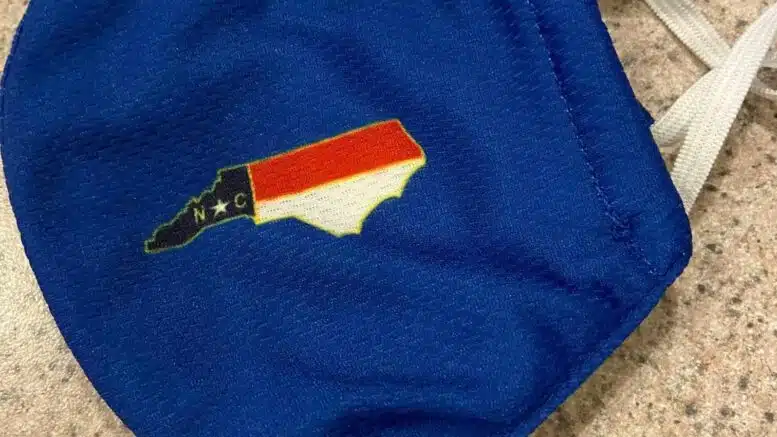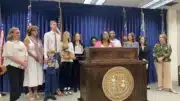By Anne Blythe
Rep. John Torbett, a Republican from the small Gaston County town of Stanley, lingered with reporters after a June 11 legislative meeting to talk about a law that would govern when and where people can wear face masks in North Carolina.
Republicans in the state Senate had overhauled one of his bills earlier in the session to ban face coverings in public, even for public health purposes.
That possibility thrust North Carolina into the national spotlight and drew widespread criticism from people with compromised immune systems, family members of people battling contagious diseases, health care providers — and even Jerome Adams, who was Surgeon General during the Trump administration.
Torbett was not supportive of a total ban on masks, nor were other Republicans in his chamber. That opposition led to the North Carolina House of Representatives rejecting the state Senate’s proposed total ban on May 22. The disagreement between the two chambers resulted in behind-the-scenes compromising and an overhauled House Bill 237.
That compromise proposal was approved by the House on June 11 in a 69-43 party-line vote. It allowed people to wear a “medical or surgical grade mask for the purpose of preventing the spread of contagious disease.”
“Basically, you can wear a mask for health or safety if you’re not planning on breaking the law,” Torbett said before the full House took a vote. “If you do break the law, and you are wearing a mask, then your conviction is heightened because you are wearing a mask.”
But before the full House gathered, as Torbett mingled with reporters, he speculated that the bill would be vetoed by the governor.
That’s because in addition to alterations to pandemic-era mask legislation, the compromise bill included changes to campaign finance law that critics contend would let donors give significant amounts to political campaigns without having their name directly identified with the donation.
Detractors argued that while Republican lawmakers wanted to unmask protesters, they supported shielding the identities of mega-donors.
Veto stamp wielded
As expected, Democratic Gov. Roy Cooper wielded his veto stamp on the bill given the short title “Various Criminal and Election Law Changes.”
“This legislation creates a gaping loophole for secret, unlimited campaign money in the middle of an election year,” Cooper said in a statement accompanying the June 24 news of the veto. “While voters are kept in the dark, this scheme allows anonymous out-of-state billionaires to flood North Carolina with campaign contributions to rescue extreme right-wing candidates that Republicans now fear will lose.”
Cooper also addressed the mask portion of the bill, which has sowed confusion about what is and isn’t acceptable across the state.
“The legislation also removes protections and threatens criminal charges for people who want to protect their health by wearing a mask,” Cooper said at the conclusion of his statement.
The governor’s veto started the clock on what many expect to be a vote this session to override his action. The General Assembly has Republican super-majorities in both chambers, so they don’t have to enlist support from Democrats if the House and Senate leaders can keep their party in lockstep.
Protests breed mask protests
The focus on masking in public arose this session as a result of protests on college campuses over the Israel-Hamas conflict. Video footage and still photographs from UNC Chapel Hill and other protests across the country show many of the protesters wearing face masks and sunglasses. Those tactics helped shield the identities of some of the demonstrators.
Civil liberties advocates have encouraged masks and eye coverings to make it more difficult for police to use surveillance and facial recognition technology to target people who are exercising their free speech rights.
The bill allows law enforcement officers and property owners to ask someone to temporarily remove their mask so they can be identified. It also increases penalties for people who are wearing masks while blocking roadways intentionally during protests or while committing a crime.
“Bad actors have been using masks to conceal their identity when they commit crimes and intimidate the innocent,” Sen. Danny Britt, a Lumberton Republican, said in a statement after the governor’s veto. “Instead of helping put an end to this threatening behavior, the governor wants to continue encouraging these thugs by giving them more time to hide from the consequences of their actions. I look forward to casting a vote to override this veto and allowing those with actual health concerns to protect themselves and others.”
As the political jockeying plays out, questions are swirling about masks. A sampling includes:
- What if I have allergies, can I still wear a mask?
- I am a cancer patient but don’t have a contagious disease. Am I breaking the law if I wear a mask?
When asked by a reporter if a cloth mask could be worn at the grocery store or while mowing the lawn, Torbett said it was his understanding that they could.
“As long as you’re not breaking the law,” he said.
Immune deficiencies
Ginny Dudek, a registered nurse, was outside the Legislative Building on June 11 with a group of people speaking out against the proposal.
“As a person with common variable immune deficiency, I am speaking for myself and my friends to express urgency and the need to protect our health.” Dudek said. “My body doesn’t make antibodies to fight infection and for this reason, I wore a mask long before COVID to try to reduce infection and injury to my lungs. This is a lifelong condition with no cure in sight.”
The bill that was approved by the House — only hours after Dudek and democracy advocates spoke — went from bad to worse, she said.
“As written, a mask must only be worn for the purpose of preventing the spread of contagious disease,” Dudek pointed out. “This bill added language that gives anyone who is in the same space as me, whether it is in a public or private location, the right to request that I remove my mask to show my face.”
Dudek said “the likelihood of someone asking a gray-haired Boomer like me, who for the most part lives in a bubble, to remove my mask is unlikely. However, people of all ages and races have immune deficiencies and need the right to wear a mask to protect them from contracting contagious, respiratory infections.”
Tobi Lippin, a Durham resident who also has an immune deficiency, has many of the same concerns as Dudek. She does not have a contagious disease, she said, but she would be vulnerable if someone asked her to remove her mask.
“The current language is not specific enough,” Lippin told NC Health News. “The mask is the only tool we have to protect ourselves.”














